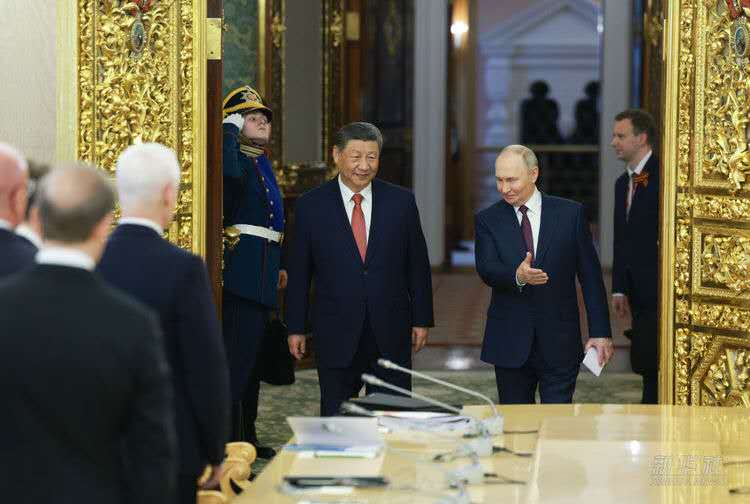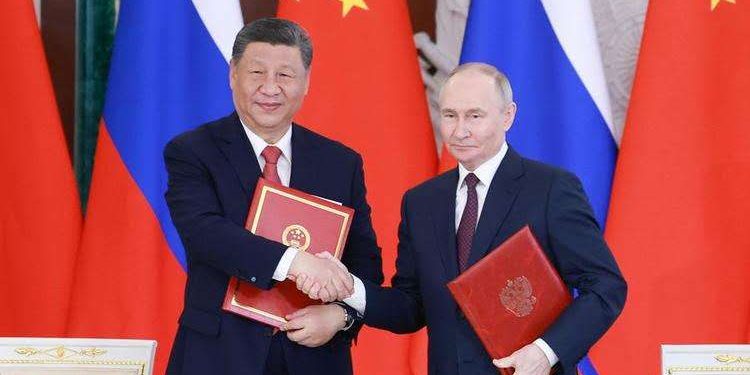CHINESE President Xi Jinping and President Vladimir Putin have agreed to deepen the China- Russia comprehensive strategic partnership, jointly uphold the correct historical perspective of WWII, and safeguard the authority of the United Nations to promote an equal and orderly multipolar world.
The two leaders met at the Kremlin in Moscow on the morning of Thursday 8 April and had an in-depth exchange of views on China-Russia bilateral relations, as well as major regional and international issues. They engaged in both small group and large group discussions.
Xi was in Russia from Wednesday 7 May to Saturday 10 May for a state visit, and to attend the 80th anniversary of the Victory in Soviet Union’s Great Patriotic War at the invitation of Putin.
Xi highlighted that this year marks the 80th anniversary of the victory of the Chinese People’s War of Resistance against Japanese Aggression, the Soviet Union’s Great Patriotic War and the World Anti-Fascist War, during which the Chinese and Russian peoples made immense sacrifice and secured great victory.
He acknowledged the pivotal contribution of the Chinese and Russian peoples to world peace and human progress is a shining chapter in the annals of history.
“And today, in the face of unilateralist countercurrents, bullying and acts of power politics, China is working with Russia to shoulder the special responsibilities of major countries and permanent members of the U.N. Security Council with courage and conviction, uphold the correct historical perspective on WWII, safeguard the authority and standing of the U.N., firmly defend the victorious outcome of WWII, resolutely defend the rights and interests of China, Russia and all other developing countries, and jointly promote an equal and orderly multipolar world and a universally beneficial and inclusive economic globalization,” the Chinese President said.
Xi noted that in recent years, through the joint efforts of both sides, the China-Russia relations have maintained the momentum of steady, sound, and high-quality growth, and on that note, acknowledged that long-lasting good-neighborliness and mutually beneficial and win-win cooperation have become the defining feature of this relationship.
“The foundation of mutual political trust has grown stronger, the ties of results-oriented cooperation have become more robust, and people-to-people exchanges and subnational interactions have flourished. The China-Russia relationship in the new era is characterized by greater confidence, stability and resilience.
“History and reality have fully demonstrated that the sustained development and deepening of China-Russia relations is a logical effort for keeping the long-standing friendship between the two peoples, a natural choice for helping each other succeed and achieve development and revitalization, and a response to the call of our times for upholding international fairness and justice and advancing the reform of the global governance system,” he further noted.

Xi noted that China and Russia should keep to the overall direction of cooperation, steer clear of external interference, and provide a more solid foundation and more robust momentum for cooperation and they should leverage their complementary resource endowments and industrial systems to expand high-quality, mutually beneficial cooperation in areas such as trade, energy, agriculture, aviation and aerospace and artificial intelligence.
He also noted the importance of building a high-standard framework for connectivity by synergizing Belt and Road cooperation and the Eurasian Economic Union, and the potential of fully unleashing the China-Russia Years of Culture with greater cooperation in education, film, tourism, sports, and subnational exchanges to foster closer people-to-people bonds.
Thus, he further noted that China and Russia should engage in closer coordination and cooperation on multilateral platforms such as the United Nations, the Shanghai Cooperation Organization (SCO) and BRICS to maintain Global South solidarity, uphold true multilateralism, and spearhead global governance reforms in the right direction. BRICS is a group of 11 countries, Brazil, India, China, South Africa, Saudi Arabia, Egypt, United Arab Emirates, Ethiopia, Indonesia and Iran, that serves as a political, diplomatic and economic development coordination forum for countries from the Global South.
Xi emphasized that China is building itself into a modern socialist country and striving for rejuvenation of the Chinese nation on all fronts through a Chinese path to modernization.
He said China is determined and confident of overcoming all risks and challenges and that regardless of changes in the external environment, it will firmly focus on managing its own affairs well.
Xi assured Putin that China will work with Russia to shoulder the special responsibilities entrusted by the times, uphold the global multilateral trading system, keep the global industrial and supply chains stable and well-functioning, and make a greater contribution to promoting each other’s development and revitalization and upholding international fairness and justice.
President Putin, in turn, expressed a warm welcome to President Xi for his state visit to Russia and participation in the celebrations marking the 80th anniversary of the victory of the Soviet Union’s Great Patriotic War.
He noted that this visit was of great significance as it would not only inject strong momentum into the development of Russia-China relations, but also help safeguard the victorious outcome of WWII.
President Putin said the Russia-China relationship is built on equality and mutual respect, adding that it is neither directed against any third party, nor swayed by any transient matters.
“It is Russia’s strategic choice to unswervingly advance relations and expand mutually beneficial cooperation with China. Russia firmly adheres to the one-China principle and consistently supports China’s position on the Taiwan question.
“Russia will work with China to maintain close high-level exchanges, strengthen results-oriented cooperation in trade, investment, energy, agriculture, science, and technology, deepen people-to-people exchanges in education, culture, youth, and tourism, and further broaden the dimensions of cooperation in the Far East. Imposing high tariffs defies common sense and has no legal basis. It will only backfire,” Putin said.
Putin noted that Russia and China should enhance coordination and cooperation in multilateral frameworks such as the UN, the SCO and BRICS, support the progress toward a multipolar world, jointly oppose unilateralism, resist the abuse of sanctions and bloc-based confrontation, and safeguard the common interests of the international community.
President Putin noted that both Russia and China had made tremendous sacrifice in the World Anti-Fascist War. Under the strong leadership of the Communist Party of China, the Chinese people fought heroically and achieved a great victory in the war of resistance against Japanese aggression, making a significant contribution to the victory of WWII.
He also noted that during those arduous war-torn years, Russia and China supported each other and forged a profound friendship that laid a solid foundation for bilateral ties.
Against this backdrop, Putin agreed that the two sides must uphold the authority of the UN and international law, defend the correct narrative of WWII history, safeguard international fairness and justice, and jointly create a brighter future for both countries and the world at large.
After the talks, the two presidents signed the Joint Statement Between the People’s Republic of China and the Russian Federation on Further Deepening the China-Russia Comprehensive Strategic Partnership of Coordination for the New Era on the Occasion of the 80th Anniversary of the Victory of the Chinese People’s War of Resistance Against Japanese Aggression, the Soviet Union’s Great Patriotic War and the Founding of the United Nations.
They witnessed the exchange of over 20 bilateral cooperation documents, covering areas such as global strategic stability, upholding the authority of international law, biosecurity, investment protection, digital economy, quarantine, and film cooperation.
The two leaders directed the relevant departments of their two countries to follow through on the consensus reached, enhance communication and coordination, promote results-oriented cooperation, and achieve more tangible outcomes.
They also jointly met the press before President Putin hosted a welcoming banquet for President Xi at noon.
By DELI-SHARON OSO
In Beijing, China









